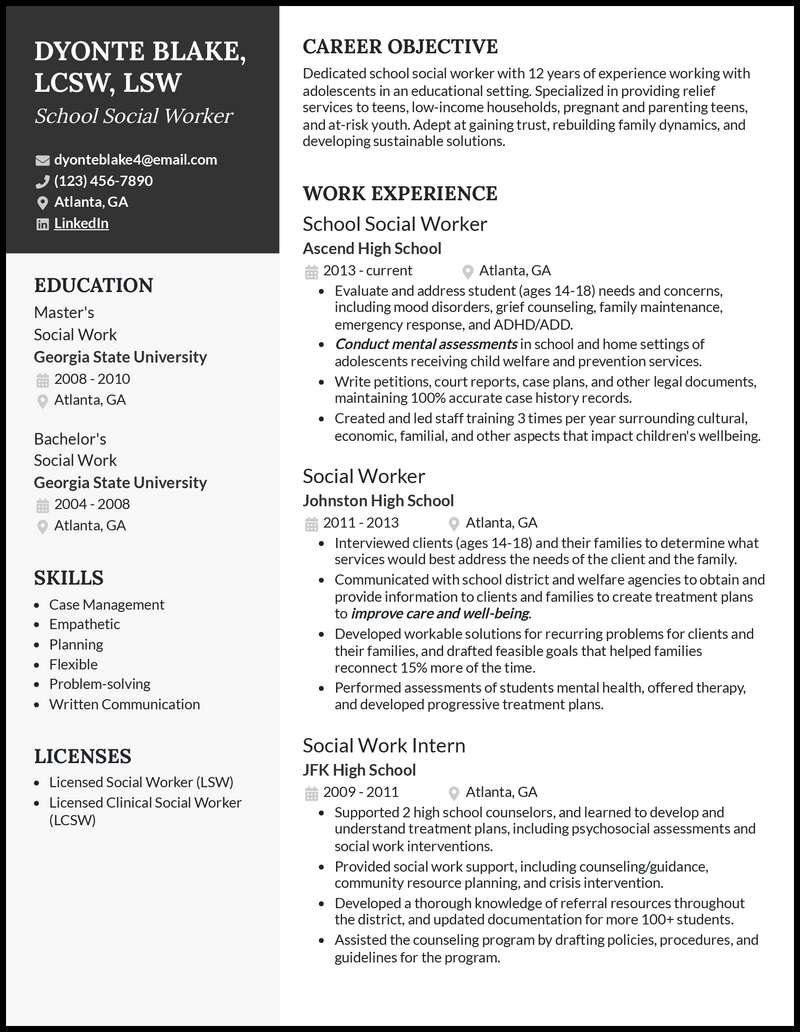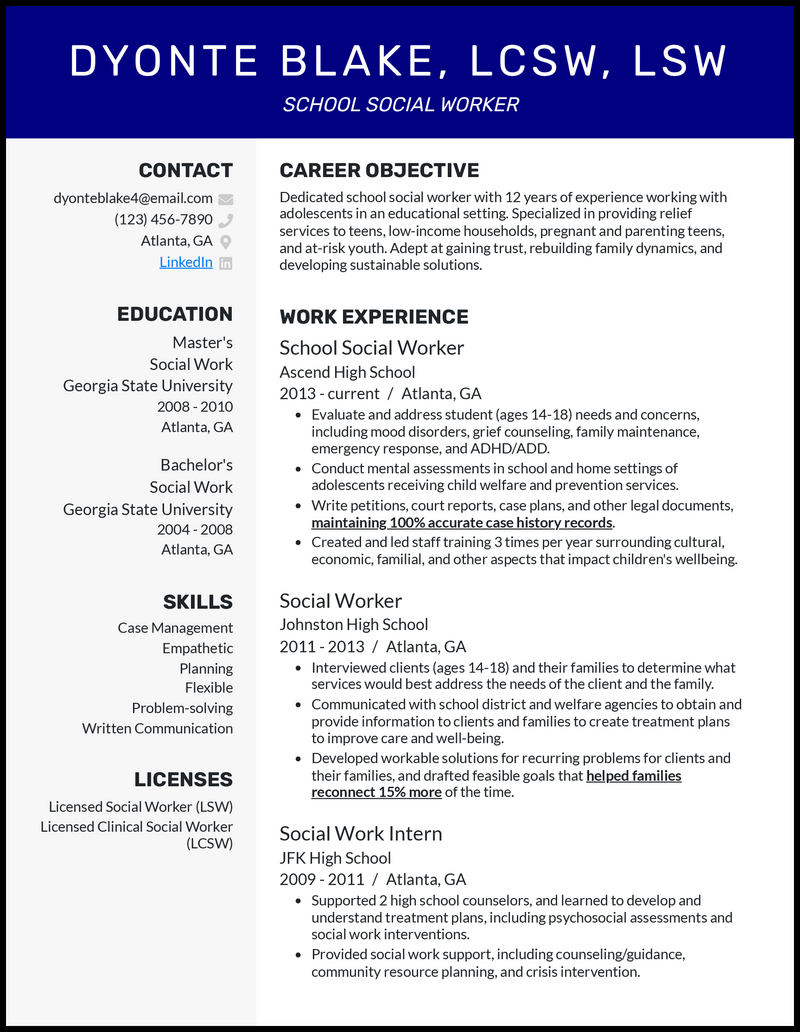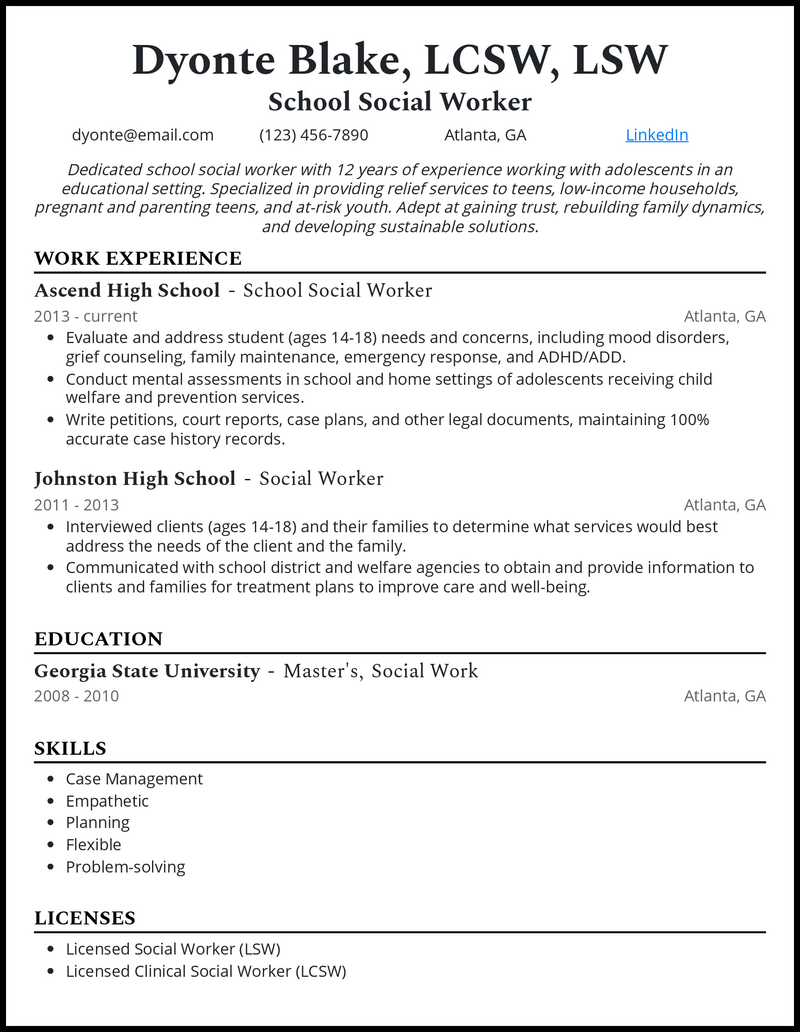You know there’s more to it when someone’s labeled the “problem kid,” and you’re there to find out what it is. As a school social worker, you help students overcome difficulties in their lives by speaking with them and their families about issues like truancy, learning struggles, and social or behavioral issues.
But how do you go about writing an effective cover letter or sharing what you’re capable of accomplishing through social work in a compact, readable resume? What kind of writing tone should you use?
Don’t worry! These three resume guides and time-tested advice have helped plenty of school social workers, and they can help you, too.
Why this resume works
- Recruiters want the full scoop on you—from your skills and personality to academic qualifications and cultural fit. However, don’t fall into the trap of oversharing personal details in your school social worker resume.
- Sure, anti-discrimination laws are clear-cut: factors such as race, ethnicity, age, political beliefs, and marital status shouldn’t sway hiring decisions. Still, adding such info to your resume could see your job hunt efforts go up in flames, thanks to the conscious or unconscious biases some recruiters might harbor.
What Matters Most: Your Skills & Work History

You’re already familiar with the blend of hard and soft skills that go into your role as a school social worker—and so is the recruiter who’s reading your resume! Enrich your resume by sharing which skills qualify you to excel at the job instead of essentially using your skills to describe the job.
In other words, niche down your skills and make them super relevant to the profession. Make them super specific, too!
Don’t say “computer skills” when you can specify which program you use to report students’ progress or document cases. Don’t say “people skills” when you’re really highlighting your ability to problem-solve with struggling students.
Here are some examples of the skill specificity recruiters like to see:
9 top school social worker skills
- Case Management
- Empathy
- Lesson Adaptation
- Individualized Planning
- Student Assessment
- Google Sheets
- MS Word
- Problem-solving
- Flexibility
Sample school social worker work experience bullet points
Skills are essential, but experience proves that you can use skills to make yourself and your own unique methods essential! When you show recruiters that you’ve been able to demonstrate your effectiveness in the past, you also make a solid case for your qualifications in the role at hand.
Pick the highest, most relevant points of your past experience and give them the spotlight: How did you help reduce truancy rates? When did you help students improve by a whole letter grade?
And don’t forget to include quantifiable data! Use numerical metrics like graduation percentages or student feedback ratings to measure the positive impact you’ve had in your field.
Here are some good samples:
- Developed workable solutions for recurring problems for clients and their families, drafting feasible goals that helped families reconnect during 16% more of their time spent together
- Interviewed clients ages 14-18 with their families to determine which services would best address their needs, earning a personal feedback rating of 89%
- Conducted mental assessments in school and home settings of adolescents receiving child welfare and prevention services, reducing crisis rates by 11%
- Wrote petitions, court reports, case plans, and other legal documents for review, maintaining a 99% case history accuracy rate
Top 5 Tips for Your School Social Worker resume
- Mix up your metrics
- Use different types of metrics to highlight various areas of your expertise. Let percentages show attendance improvement rates. Let personal rating increases demonstrate your compassionate guidance methods, etc. When you vary your metrics, your experience points will naturally become more interesting!
- Vary your context
- If you’ve worked in a niche within your social work with students, your metrics may often look similar. There’s nothing wrong with specialization! But to keep your resume intriguing, switch up the backstory behind your metrics: Who or what did you work with to achieve them?
- Keep it simple
- You’re probably used to school environments with plenty of vibrant colors, but don’t go overboard on your resume. Readability should take top priority since you need to give recruiters as much info as you, as quickly as you can. Don’t sacrifice contrast or use distracting shades on your resume!
- Summarize strategically
- If you write a resume summary, make sure you use that page space for only the most valuable factoids about why you’re qualified for the job. Point out that you specialize in helping parenting teens or mention that you’re experienced with low-income households. Go for quality over quantity with your traits and niches!
- Pick the template that fits best
- Your resume template is like the “interview suit” that you dress up your qualifications in: It makes a virtual first impression on recruiters before you even meet directly, so make sure that the template you use places your best qualifications front and center.
There are definitely some weak ones out there that don’t help much! Any “free-floating numbers” like random headcounts or numbers of student groups could probably be replaced or left out, unless they directly strengthen your impact metrics.
If the company requests references, make sure they’re included separately. You could even include them in the form of professional recommendation letters related to social work.
Refer to the original job description for some guidance here: You’ll find a lot of it! The way the social worker job ad is written will give you a good example of the social work culture you’d be involved in, and reflecting that tone will show that you’re a good fit.








